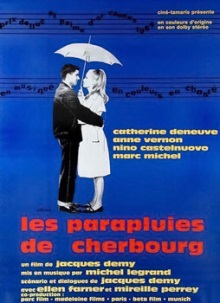
Here is yet another entry that was explicitly selected to advance my still pathetic familiarity with the history of cinema. This film was originally made in 1963. The version we watched was digitized and restored in 2013, its 50th anniversary. This was necessary because the original version used vivid and supersaturated colours which were not able to survive for long as physical film stock.
Indeed, watching this I felt that the colours looked so rich and so vibrant that it’s hard to believe that this is a 1963 movie. The colour choices are striking too as they are all cheery and bright ones: red, orange, purple, pink etc. Combine that with the realization that every line of dialogue in the film, no matter how banal, is sung rather than spoken and you’ll soon agree that this film offers a very unique viewing experience indeed.
It’s also a very surreal experience. The romantic story it tells is simple, arguably the simplest form such a story could be distilled down to. Catherine Deneuve expresses her uncomplicated and unrestrained passion with such verve that it cannot fail to attract the viewer. Yet the simplicity of the emotions and the fairy-tale like setting constantly remind us of how none of this can be quite real. In one scene, the pair of lovers glide smoothly and soundless down a street. It is so impossible, so magical that it seems as if the director wanted to remind us of the artificiality of the moment.
And of course, though it would be spoiling the film to say this, the magic doesn’t last. There are no villains in this movie unless real-life itself, with the practicalities of making a living and being separated, is the villain. This may not novel now but think about what a splash of cold water this film must have been when it was first released. This is apparently the French New Wave’s response to the musicals of Hollywood which peaked in popularity in the 1950s. Take their catchy musical numbers, their stage gaudiness, their cheesy romance and ramp it all up to eleven. And then dash it all against the cold, hard rock of reality.
Browsing around the web for other reviews of this film, I’ve found plenty of interesting things such as the innovative cinematography, the subtle direction and how the final scene deliberately plays music which suggests one type of ending but shows us a completely different one instead etc. This is to say that for such a seemingly simple film, it has a surprising amount of depth even if most of it will be relevant only to a film student.
For an average film aficionado raised in the grittier, darker cinematic world of today, all this would understandably seem less impressive. Yet for all that, The Umbrellas of Cherbourg remains an entertaining, engaging and rather unique film.
One thought on “The Umbrellas of Cherbourg (1964)”